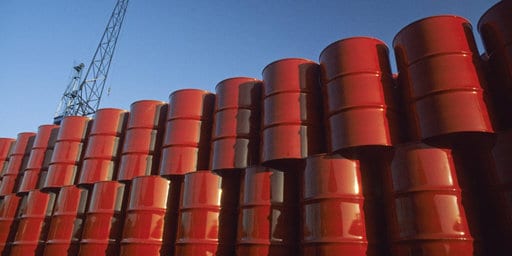The fossil fuel industry is at a precipice, with falling demand and rising investment, combined with increased competition from clean technologies and tougher government policies expected to slash the value of oil, gas, and coal reserves by nearly two thirds, according to new research from climate think-tank Carbon Tracker.
According to a new report published by Carbon Tracker, the fossil fuel industry stands at the precipice of “terminal decline” due to a range of pressures, including increasing competition from clean technologies.
The report says the current COVID-19 pandemic has only accelerated the pressure – although, this only highlights how vulnerable to disruption the fossil fuel industries are in general. Growth in fossil fuel demand was below 1% per year even before the COVID-19 pandemic, while at the same time clean technology continues to increase its contribution to world energy demand.
Moreover, renewable energy technologies are already the cheapest form of bulk energy production across 85% of the world, while electric vehicle batteries are becoming comparable with the cost of conventional car engines.
These realities are not simply theoretical, either, as electricity companies across the globe continue to rapidly switch their focus to renewable energy technologies, and car manufacturers are shifting production to electric vehicles and away from conventional internal combustion engine (ICE) vehicles.
Figures published earlier this year by the International Energy Agency show a gloomy picture for the fossil fuel industries – with global coal demand expected to fall by 8% in 2020, global oil demand could fall by up to 9%, and even natural gas could decrease by around 5%.
The new Carbon Tracker report – Decline and Fall: The Size & Vulnerability of the Fossil Fuel System– explains how fall demand for fossil fuel inherently leads to overcapacity, which serves to drive down prices, cutting profits and company share prices, requiring many companies to write off assets, cancel investment, or even file for bankruptcy. Even those companies who manage to stay afloat will be making much less money than they were before.
“We are witnessing the decline and fall of the fossil fuel system,” said Kingsmill Bond, Carbon Tracker Energy Strategist and report author. “Technological innovation and policy support is driving peak fossil fuel demand in sector after sector and country after country, and the COVID-19 pandemic has accelerated this. We may now have seen peak fossil fuel demand as a whole.
“This is a huge opportunity for countries that import fossil fuels which can save trillions of dollars by switching to a clean energy economy in line with the Paris Agreement. Now is the time to plan an orderly wind-down of fossil fuel assets and manage the impact on the global economy rather than try to sustain the unsustainable.”
More than simply moving to save money and make clean, sustainable moves forward, Carbon Tracker warns that the size of the fossil fuel economy suggests its decline could pose a significant threat to global financial stability.
The fossil fuel system boasts physical supply and demand infrastructure worth $US32 trillion and includes a whole range of industries not immediately recognised as “fossil fuel” – including producers of coal, oil and gas; companies which make and run power stations, cars, trucks, planes and ships; the steel, cement, petrochemical and aluminium industries which are heavy users of fossil fuels; and the companies which supply and build their infrastructure.
Companies across the fossil fuel system, according to Carbon Tracker, are worth $US18 trillion in listed equity – accounting for a quarter of the total value of global equity markets – and $US8 trillion in corporate bonds – more than half the non-financial corporate bond market. Moreover, the fossil fuel industry’s unlisted debt – much of it owed to banks – may be as much as $US30 trillion.
Looking at the specific potential decline of the fossil fuel industries, in 2018 the World Bank valued future profits from oil, gas, and coal at $39 trillion. However, if demand falls by 2% each year in line with the Paris Agreement, and discount rates rise in line with increased risk, Carbon Tracker expects that future profits could collapse by nearly two-thirds, falling to only $14 trillion.
Carbon Tracker also posits that producers in the fossil fuel industry currently expecting a return to business as usual may be banking on a return to much higher profits – well in excess of $US100 trillion.
Fossil fuel industry giants such as Exxon are still forecasting continued growth in demand for fossil fuels, while the fossil fuel system as a whole has been investing $US5 trillion a year on new supply and demand infrastructure. However, against these rosy expectations are Shell’s recent cut in dividends, Repsol’s decision to write off €4.8 billion of assets last year, and growing bankruptcies across the US shale oil sector.
Similarly at risk are the world’s giant petrostates – countries whose economies rely on oil export income such as Saudi Arabia, Russia, Iraq, and Iran, as well as countries that Carbon Tracker deem as particularly vulnerable, such as Venezuela, Ecuador, Libya, Algeria, Nigeria, and Angola.
Investors in the fossil fuel industry also remain at particular risk, who will begin to be hit as returns fall creating less capital available for dividends and interest payments. Carbon Tracker points to the UK as an example, where the oil and gas sector generated 24% of dividends from the FTSE Index in 2019. According to Carbon Tracker, markets could sell down stock in anticipation of peak demand long before assets are written down.
Pressure within the industry is only being exacerbated by pressure from government policy decisions, as governments across the planet continue to refine their clean energy and emissions reduction targets to put themselves more in line with the Paris Agreement.
In the end, as the report warns investors, “There is far more risk inherent in the fossil fuel system than is conventionally priced into financial markets. Investors need to increase discount rates, reduce expected prices, curtail terminal values and account for the clean-up costs.”










